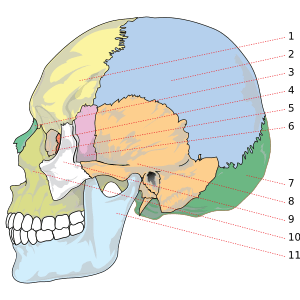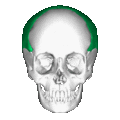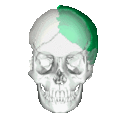Parietal bone facts for kids
The parietal bones are two important bones in your human skull. They form a big part of the top and sides of your head. Think of them as the roof and side walls of your skull! The word "parietal" comes from Latin and means "wall." These bones protect your brain and help give your head its shape. They are also where some muscles attach, like the ones you use for chewing.
Contents
What are Parietal Bones?
Your skull is made of many bones that fit together like a puzzle. The parietal bones are two large, flat bones that sit at the top and sides of your head. You have one on the left side and one on the right side. Together, they make up a large part of your cranium, which is the bony case that protects your brain.
These bones are quite strong because their main job is to shield your brain from bumps and injuries. They also help to support the shape of your head.
Where are They Located?
The parietal bones are found right behind your frontal bone (your forehead bone) and above your temporal bones (the bones near your temples). They meet in the middle of your head at the top.
How They Connect to Other Bones
Your skull bones are connected by special joints called sutures. These are like zig-zag lines that lock the bones together very tightly.
- The parietal bones meet each other at the top of your head along a line called the sagittal suture.
- They connect to the frontal bone at the front of your head along the coronal suture.
- At the back of your head, they join the occipital bone along the lambdoid suture.
- On the sides, they connect to the temporal bones along the squamosal suture.
These sutures allow the skull to grow when you are young. In babies, these connections are not fully closed, which allows the brain to grow quickly. As you get older, the sutures become very strong and mostly fixed.
What Do They Do?
The main job of the parietal bones is to protect your brain. They form a strong, bony shield around the top and sides of your brain.
They also provide a place for some muscles to attach. For example, the temporalis muscle attaches to the parietal bone. This muscle is very important for chewing food. When you chew, this muscle helps to move your jaw up and down.
Images for kids
-
The coronal suture. It separates the parietal bones from the frontal bone.
-
The squamosal suture. It separates the parietal bones from the temporal bone.
-
The lambdoid suture. It separates the parietal bones from the occipital bone.
See also
 In Spanish: Hueso parietal para niños
In Spanish: Hueso parietal para niños
 | Kyle Baker |
 | Joseph Yoakum |
 | Laura Wheeler Waring |
 | Henry Ossawa Tanner |








